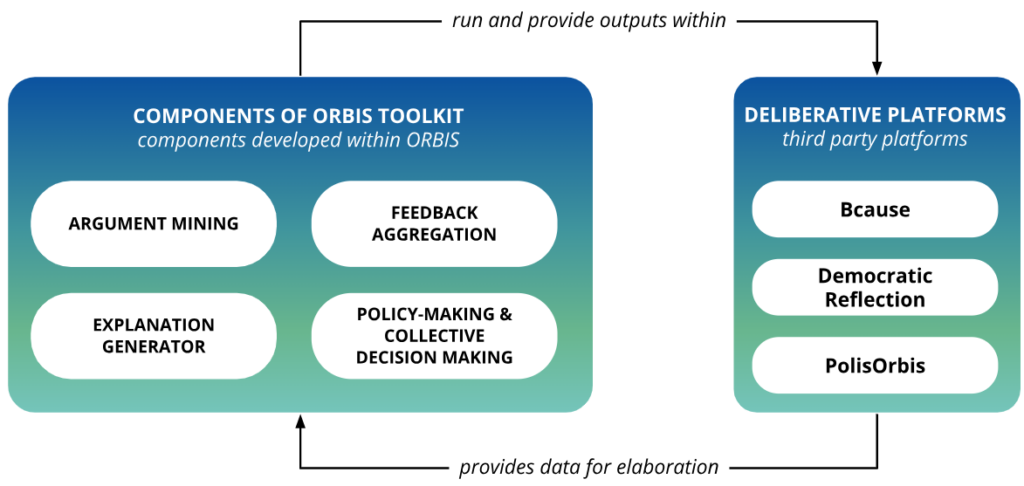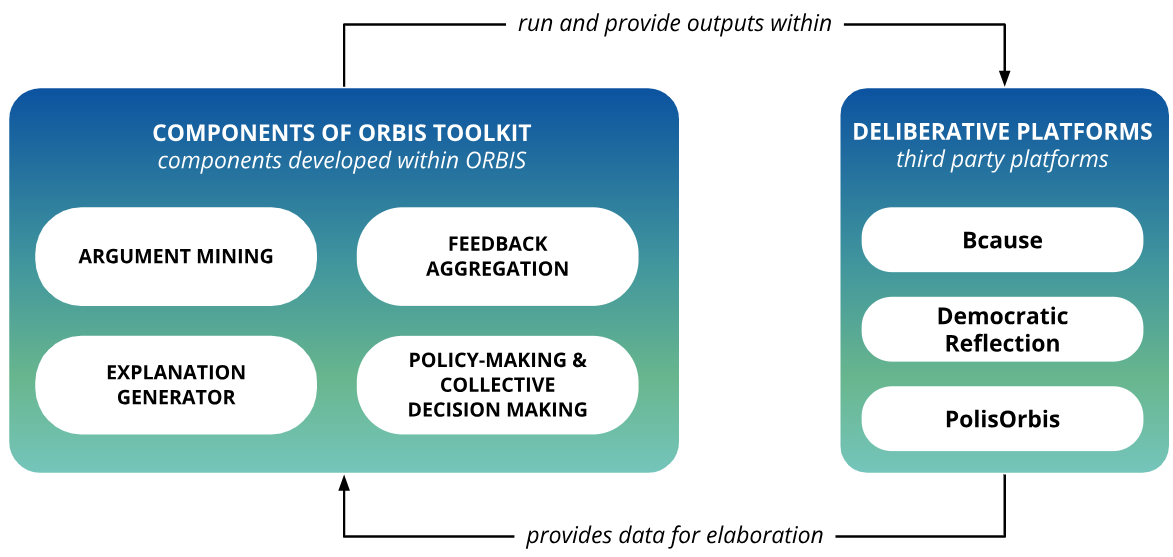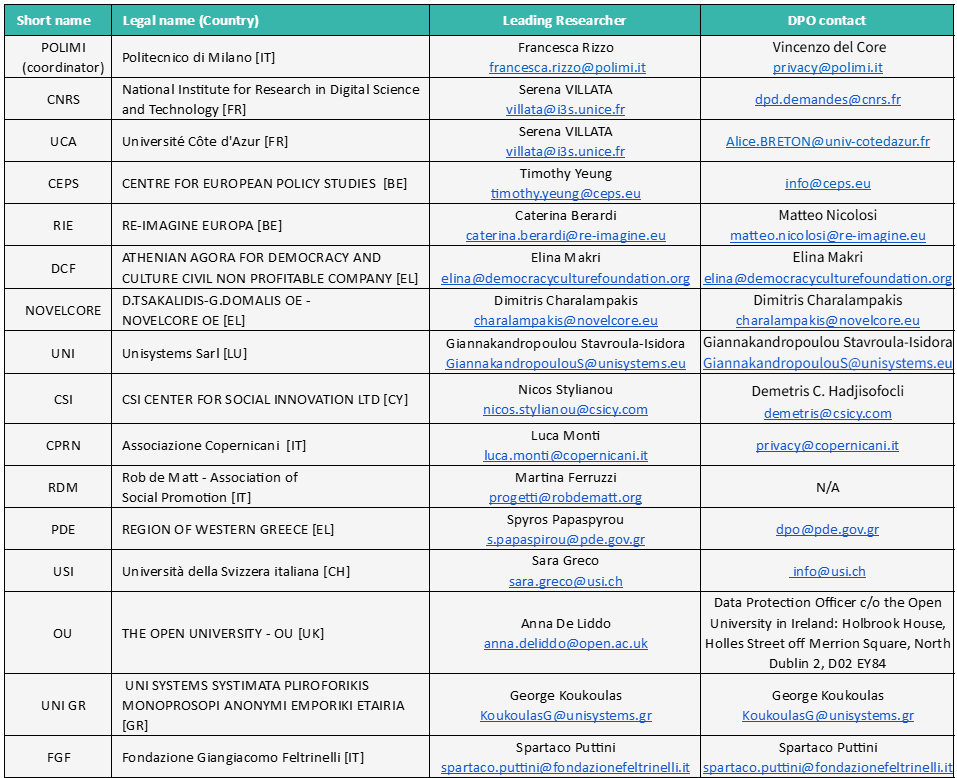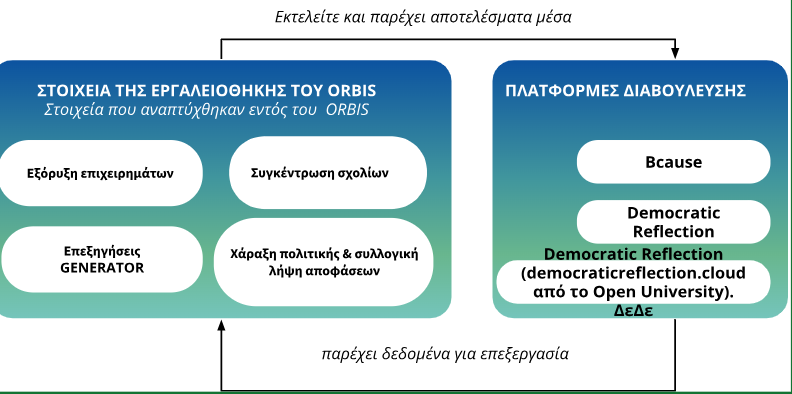PARTICIPANT INFORMATION SHEET,
PRIVACY POLICY AND INFORMED CONSENT (art. 13 G.D.P.R.)
Dear participant,
You are invited to participate in this study of the ORBIS project, which uses Artificial Intelligence to boost deliberative democracy in Europe and increase citizen’s participation.
In the document below you can find the following:
- PARTICIPANT INFORMATION SHEET
- PRIVACY POLICY
- INFORMED CONSENT FORM
The following information is provided to inform you about the purposes of data collection and processing in ORBIS and help you to decide about your participation or not. The terms of service document explains it in detail. Please carefully read it, and do not hesitate to ask the project team any questions you may have before deciding to participate in this research. You can inquire at any time, whether it is before, during, or after your participation. Please be aware that you have the option to withdraw from the study at any time without providing a reason, and there will be no consequences for you.
ORBIS brief description
ORBIS “Augmenting participation, co-creation, trust and transparency in Deliberative Democracy at all scales” [GA: 101094765] is a Horizon Europe project that aims to bridge the gap between ambitious democratic ideas and collective actions on a large socio-technical scale, fostering inclusive and transparent Deliberative Democracy in Europe. It provides practical solutions for citizen engagement, leveraging AI-enhanced tools and socio-technical approaches for making democracy more deliberative. To know more, you can visit the project page on the CORDIS portal (https://cordis.europa.eu/project/id/101094765) or the project website (https://orbis-project.eu).
ORBIS technological solution
The ORBIS toolkit consists of specifically developed components (n. 4), that aim to support innovation in socio-technical approaches to deliberative democracy and e-participation. The toolkit’s components are: (i) Argumentation mining, (ii) Explanation generator, (iii) Feedback aggregation, and (iv) Policy-making and collective decision making.
The toolkit can be deployed to assist deliberative debates that take place in the project’s associated deliberation platforms (n. 3), where users are invited to login and participate in a discourse. These platforms serve as third party services, provided by specific ORBIS partners. More specifically, the deliberation platforms involved are: Bcause (bcause.kmi.open.ac.uk by Open University), PolisOrbis (polisorbis.copernicani.it via Copernicani), and Democratic Reflection (democratic-reflection.web.app by Open University).

Access to the ORBIS platforms is granted through the ORBIS website or directly via third-party platforms, using secure authentication methods. Users can log in either via Zitadel—GDPR-compliant identity management system (https://zitadel.com/gdpr)—or via Google authentication.
When accessing via Google, ORBIS receives default user data including email address, first name, and surname. Optional data are telephone number and preferred language may be optionally provided by the user during the registration process.
The personal data processed originates either directly from the user (when registering manually via Zitadel or completing optional fields) or from the Google account used to authenticate. These data are only used to manage user access, support secure login, and facilitate communication. We will use the data collected from your participation to communicate with you during the pilot activities and to share with you the main results and insights from the deliberation you contributed to. This feedback loop is part of our commitment to transparency and to involving participants in every stage of the democratic process. Communication may occur both during the pilot and upon completion of the pilot activities, always within the framework of the ORBIS project and only up until the end of the project’s duration, which is set for 31 January 2026. In line with ORBIS’s commitment to data minimization, only the information strictly necessary to enable platform access and support user interaction is collected and processed.
Technical and organizational measures in place to ensure compliance with GDPR principles are presented below
Project partners (Independent Data Controllers)
| Short name | Legal name (Country) | Leading Researcher | DPO contact |
| POLIMI (coordinator) | Politecnico di Milano [IT] | Francesca Rizzo francesca.rizzo@polimi.it |
Vincenzo del Core privacy@polimi.it |
| CNRS | National Institute for Research in Digital Science and Technology [FR] | Serena VILLATA | dpd.demandes@cnrs.fr |
| UCA | Université Côte d’Azur [FR] | Serena VILLATA villata@i3s.unice.fr |
Alice.BRETON@univ-cotedazur.fr |
| CEPS | CENTRE FOR EUROPEAN POLICY STUDIES [BE] | Timothy Yeung timothy.yeung@ceps.eu |
info@ceps.eu |
| RIE | RE-IMAGINE EUROPA [BE] | Caterina Berardi | Matteo Nicolosi matteo.nicolosi@re-imagine.eu |
| DCF | ATHENIAN AGORA FOR DEMOCRACY AND CULTURE CIVIL NONPROFITABLE COMPANY [EL] | Elina Makri elina@democracyculturefoundation.org | Elina Makri elina@democracyculturefoundation.org |
| NOVELCORE | D.TSAKALIDIS-G.DOMALIS OE – NOVELCORE OE [EL] | Dimitris Charalampakis charalampakis@novelcore.eu | Dimitris Charalampakis charalampakis@novelcore.eu |
| UNI | Unisystems Sarl [LU] | Giannakandropoulou Stavroula-Isidora GiannakandropoulouS@unisystems.eu | Giannakandropoulou Stavroula-Isidora GiannakandropoulouS@unisystems.eu |
| CSI | CSI CENTER FOR SOCIAL INNOVATION LTD [CY] | Nicos Stylianou | Demetris C. Hadjisofocli demetris@csicy.com |
| CPRN | Associazione Copernicani [IT] | Luca Monti | privacy@copernicani.it |
| RDM | Rob de Matt – Association of Social Promotion [IT] | Martina Ferruzzi | N/A |
| PDE | REGION OF WESTERN GREECE [EL] | Spyros Papaspyrou | dpo@pde.gov.gr |
| USI | Università della Svizzera italiana [CH] | Sara Greco sara.greco@usi.ch |
info@usi.ch |
| OU | THE OPEN UNIVERSITY – OU [UK] | Anna De Liddo | Data Protection Officer c/o the Open University in Ireland: Holbrook House, Holles Street off Merrion Square, North Dublin 2, D02 EY84 |
| UNI GR | UNI SYSTEMS SYSTIMATA PLIROFORIKIS MONOPROSOPI ANONYMI EMPORIKI ETAIRIA [GR] | George Koukoulas KoukoulasG@unisystems.gr | George Koukoulas KoukoulasG@unisystems.gr |
| FGF | Fondazione Giangiacomo Feltrinelli [IT] | Spartaco Puttini | Spartaco Puttini |
| Local coordinator(s): Elina Makri elina@democracyculturefoundation.org] | |||
PARTICIPANT INFORMATION SHEET
1. Project aims
The EU-funded ORBIS project aims at fostering a more inclusive, transparent, and trustworthy deliberative democracy within Europe by shaping and supporting innovative democratic models developed through deliberative democratic processes. Moreover, the ORBIS project will develop a sustainable digital environment leveraging advanced AI tools and technologies, validating the outcomes through six distinct use cases, addressing contemporary societal issues. These use cases will experiment with various civic participation and deliberation models while actively engaging stakeholders.
2. Selection criteria
Your participation in this study signifies that you have been carefully chosen by one of our pilots to engage in its deliberation activities. This selection is based on specific criteria relevant to the objectives of the pilot, ensuring a diverse and representative group of participants. Your involvement is crucial for the success of our research, as it helps us gather valuable insights and perspectives to enhance our understanding and development of deliberative democracy solutions.
3. Study activities
This study involves engaging in debates, either online or in person, but digitally enhanced, where you will share your insights and provide feedback on various topics related to democratic processes. These debates, facilitated by ORBIS solution, will occur within pilot settings, and occur through the 3 third-party platform, allowing for experimenting with and exploring how ORBIS technologies can enhance democratic deliberation.
| Typology | Name | Activity | Data processed |
| Component | Feedback aggregation | Collects and processes deliberation data | Deliberation data from platforms (dialogues, deliberation files) |
| Argumentation mining | Analyses textual discussions to extract and structure arguments | Discussion text from online deliberation platforms or transcribed dialogue, identifying premises and argumentative components | |
| Policy making and collective decision making | Uses data to deliver knowledge and recommendations for action | Outputs from argumentation mining and feedback aggregation, knowledge graph | |
| Explanation generator | Provides human-readable explanations for argumentation structures | Structured data from argumentation mining | |
| Third-party platform | Bcause [Partner: OU] |
Structures discussions with positions and pro/con arguments | User input (positions, pro/con arguments) |
| Democratic Reflection
[Partner: OU] |
Collects user reflections on ongoing events using Reflection Cards | User feedback on ongoing events, interaction data | |
| PolisOrbis
[Partner: CPRN] |
Facilitates vote casting by clicking on agree, disagree, or pass, and allows commenting | User-submitted text statements, votes |
4. Benefits
The benefits will not concern any individual participants, but they will support the development of new technological instruments and applications to make democracy more deliberative and inclusive.
5. Risks
Participation does not entail any risk since it is an observational study that only requires data collection.
6. Withdrawals
Your participation in this study is completely voluntary and you may withdraw from it at any time. You will be informed immediately in the event that information becomes available that may affect your decision to continue with the study in question.
7. Reimbursement
Participation is voluntary.
8. Duration and requirements
The duration of your participation will vary depending on the agenda set by each pilot. Activities may differ in length according to the specific requirements of the pilot you are involved with. The pilot team will provide you with the detailed agenda and timeline for the activities, ensuring you are well-informed about the schedule and expectations for your participation.
PRIVACY POLICY
9. Purpose of the study
The study aims to explore how AI and emerging technologies can be utilised to enhance deliberative processes and enhance new deliberative models, supporting participants in gaining knowledge and better elaborating information. Each pilot will explore different scales and purposes of deliberation, providing a unique deliberative journey accompanied by technological support.
The primary objective is to understand how such technology-enhanced deliberative models foster transparent and collaborative decision-making. By engaging in these activities, we aim to gather insights and feedback to improve the effectiveness and inclusivity of democratic practices. For this reason, the activities will also be assessed, evaluating how the technology supports participants in their deliberative activities and decision-making practices. Findings will help us refine and enhance the tools and methodologies used, ensuring effective contribution making deliberation more democratic.
Depending on the pilot’s deliberation plan, the deliberations are conducted in one or more dedicated environments, supporting specific activities of the process. Such environments put in place supporting monitoring mechanisms and are monitored by pilot teams, who oversee the activities to ensure they run smoothly and effectively. The ORBIS toolkit and its four components can be used in the context of deliberative debates, taking place in the project-associated deliberative platforms. Each of these deliberation platform operates independently, has its specific privacy policy (listed below and displayed in each platform), and does not share data with each other, ensuring that analyses remain distinct and data is not combined across platforms.
Deliberative platforms’ privacy policy:
| ACTIVITY | PURPOSE | TYPOLOGY OF DATA COLLECTED |
|---|---|---|
| Debates (in-person or online) mediated by pilots | To engage participants in structured discussions on deliberative platforms on various topics | Personal information, participation data, opinion and feedback data, argumentative components |
| Experimentation of argumentation mining, explanation generation, feedback aggregation, support for policy making and collective decision-making | Support the automatic analysis of participants’ discussion data to identify relevant dynamics and outcomes, with the overall aim of improving evidence-based thinking. This involves (i) identifying argumentative text and relations among argumentative snippets; (ii) generation of explanation; (iii) clustering and summarisation of arguments; and (iv) formulation of action commitment (policy) and useful recommendations for their implementation. | Textual data as well as scoring/rating data related to participants’ deliberation. This includes argumentative text (statements or comments), relations among argumentative snippets, data such as thumbs up/down, likes/dislikes. Upon registration via ORBIS website, this data is pseudonymised. |
| Assessment of ORBIS solutions | To explore how AI and emerging technologies can enhance deliberative processes. To evaluate the effectiveness of ORBIS tools and framework in supporting deliberation and decision-making | Data collected from pilot activities may include user feedback, user interaction data, and other relevant data to assess the acceptance and effectiveness of the ORBIS solution. This data is anonymised or pseudonymised for analysis. |
10. Purpose of the processing
The purpose of processing your data is to enhance deliberative processes and support participants in gaining knowledge and better elaborating information through the ORBIS technological solution. The deliberation platforms—Bcause, PolisOrbis, and Democratic Reflection—receive direct input from participants who are digitally engaged. The processing of data provided through such platforms concerns the interaction with the ORBIS toolkit and its four components, which work together to analyse, summarise, and provide insights from deliberative activities, facilitating evidence-based and transparent decision-making.
Each partner is an independent controller of the personal data gathered and is in charge of its anonymisation or pseudonymisation prior to any sharing. The authorised Controller of processing operations related to the activity described above will process your common personal data and special data only with your prior, specific and explicit consent and only to the extent that they are indispensable in relation to the purpose of the study. The legitimacy basis for processing your data for the above-mentioned purposes is your explicit consent pursuant to Articles 6(1)(a) and 9(2)(a) of the GDPR. The provision of your data for this purpose is optional; however, since it is indispensable for the conduct of the research project, your refusal will not allow you to participate in it. Consent given for the aforementioned purposes may be withdrawn pursuant to Article 7 of the GDPR at any time without providing any justification.
No further data concerning you will be collected, without prejudice to the use of any data already collected to determine, without altering them, the results of the research. In the study, we may discover unexpected results, known as incidental findings, unrelated to the research goals. If significant findings emerge, we’ll promptly inform you, following our established policy for such discoveries. This ensures your informed safety.
11. Research Methodology
The project will last until 31/01/2026, followed by five years of conservation for the purpose of dissemination and publication of the Project’s results.
In the Project are involved public bodies and private subjects, both natural and legal persons, interested in bringing a contribution for a more inclusive deliberative democracy leveraging AI solutions.
ORBIS integrates technological innovation with deliberative democratic models and processes to explore how technologies can enhance deliberative practices and support participants in gaining knowledge and informing decision-making. Participants, selected by pilot teams and informed through the ORBIS information sheet and privacy policy, provide consent via the ORBIS registration form. Data is collected during online and in-person debates, community-led initiatives, and collaborative decision-making processes, focusing on personal information, participation data, opinions, and feedback. The methodology employs several technological tools incorporating AI-related technologies like NLP to improve the quality of discussions, critical thinking, and sensemaking in civic participation. Each partner is responsible for anonymising or pseudonymising data before sharing, ensuring ethical data processing based on explicit participant consent. The collected data is analysed to evaluate the effectiveness of the ORBIS tools, with findings used to refine and enhance the project’s tools and methodologies, ultimately fostering more transparent and collaborative decision-making processes.
12. Data processing methods, nature of the data
For the execution of the project, personal data will be collected and processed. The data will be retained on laboratory servers, appropriately encrypted and password protected. Information that could enable the identification of participants (first name, surname, date of birth, place of birth), collected for the sole purpose of registration in the ORBIS website and giving legal validity to the informed consent signed by the participants, will be retained in a database kept by the data controller (pilot coordinator), in charge of its collection). When personal data are gathered, they are firstly pseudonymised (see table below) and consecutively shared with the authorised researchers in charge of analysing or further elaborating the acquired data. Just the data controller will have access to the original information.
The data will be processed using computer and telematic tools, with an organisation and processing logic exclusively related to the purposes of the research, ensuring their security and confidentiality in accordance with current regulations. In this case, the data controller undertakes to:
- process data through specifically designated researchers;
- take care of the subsequent stages of processing and storing the collected data in such a way that the data subjects are not directly identified, by pseudonymising or anonymising all information;
- communicate the data and/or retain them, in pseudonymised form, in a database accessible to all participants in the research project;
- disseminate results only in aggregate and/or anonymous form.
The deliberative platforms used for digitally engaging participants in debates operate independently and do not share data among themselves. Additionally, no personal data will be inputted into the ORBIS toolkit components for processing. Only pseudonymised data will be provided to these components for elaboration, further ensuring the privacy and confidentiality of participant information.
| Pseudonymisation | |
| Process | Pseudonymising data refers to the management process where identifying fields within a data record are replaced by one or more unique identifiers.
The key or additional data to reverse the pseudonymisation is kept separate from the pseudonymised data, ensuring security and integrity of the pseudonymisation process. |
| Reversibility | Pseudonymisation is reversible under certain conditions. The original identifiers can be re-associated with the data when necessary. For example, in longitudinal studies that require monitoring the position of an individual at different times, pseudonymisation enables the linkage of data points across these timeframes while maintaining individual privacy.
The independent data controller, having access to the additional information, is the only entity that can re-associate the pseudonymised data with the original personal data. |
| GDPR relation | Pseudonymised data is still considered personal data under GDPR. Data subjects retain their rights over this data, including the rights to access, rectification, and erasure. |
13. Image and audio-video processing in research
The processing may also concern images and audio-video of those participating in debates. Their processing is carried out in compliance with the law, completely free of charge; anonymity is guaranteed wherever possible. The consent required for the processing of images is optional. Refusal does not preclude participation in the research.
14. Use of personal data in anonymous form
The data will only be disclosed in anonymous form by means of, for example, scientific publications, statistics and scientific conferences, educational activities.
15. Participants’ right to the termination of research study
Pursuant to and for the purposes of Articles 15 et seq. of the GDPR, you may access your personal data and verify their content, origin, accuracy, location (including in relation to third countries where the data are located and/or the subjects to whom the Data may be communicated), request a copy of, integrate, update, rectify them and, in the cases provided for by applicable law, cancel, limit and transform them into anonymous form, request data portability, withdraw your consent given pursuant to Article 7 of the GDPR and lodge a complaint with the competent supervisory authority pursuant to Article 77 of the GDPR (Personal Data Protection Authority). We also inform you that you may object to the processing of your personal data in accordance with Article 21 of the Regulation. Any change to the original data may have a significant effect on the results of the study. Therefore, when exercising rights involving variation/integration of the recorded data, the requested changes may be noted and recorded in the margin of the original data without modifying the latter.
You may terminate your participation in the study at any time and without providing any justification; in that case, no further data concerning you will be collected, without prejudice to the use of any data already collected to determine, without altering them, the results of the research. To exercise your privacy rights, you may contact the local coordinator in charge of this study at the above-mentioned addresses.
16. Retention
Personal data will only be retained for the duration of the project, and as long as is strictly necessary for its purposes and, in any case, no longer than five years once the project is completed. The data will also be processed for administrative/accounting purposes and retained for the time strictly necessary for pursuing said purposes, subject to a ten-year period to ensure the fiscal, accounting and administrative fulfilments required by law and subject to possibly longer terms, which cannot be determined in advance, as a result of different conditions for lawful processing (e.g. legal proceedings that require processing for more than ten years).
17. Dissemination
Results of the research and of this study can be published with anonymised data only. This ensures that it will not be possible to identify you in any way. Your personal data will never be published.
INFORMED CONSENT FORM
Project title: “Augmenting participation, co-creation, trust and transparency in Deliberative Democracy at all scales (ORBIS)”
By clicking to register, I voluntarily, as a choice under free will, consent to participate in ORBIS “Augmenting participation, co-creation, trust and transparency in Deliberative Democracy at all scales” [GA No 101094765].
I acknowledge that my participation and the data I provide will be handled in accordance with art. 13 of the EU General Data Protection Regulation (GDPR) 2016/679. Measures are in place to ensure the confidentiality and security of my personal data. More detailed information on how my data will be used, stored, and protected is available upon request.
I have been informed about the details of my involvement, which include:
- Access to the ORBIS digital environment is provided via the ORBIS website using GDPR-compliant authentication through Zitadel (https://zitadel.com/gdpr) or Google.
- Depending on the pilot’s deliberation plan, the deliberations are conducted in one or more dedicated environments (Bcause, Democratic Reflection, PolisOrbis), supporting specific activities of the process. These platforms host the debates, allowing for your participation in the discourse.
- From the platform, I can interact with the ORBIS toolkit AI-boosted components, which comprises (i) Argumentation mining, (ii) Explanation generator, (iii) Feedback aggregation, and (iv) Policy-making and collective decision making.
- Personal data are anonymised or pseudonymised prior any sharing within the ORBIS digital environment.
By proceeding, you acknowledge that you have read, understood, and agree to the terms and conditions outlined in the Project Information Sheet and Privacy Policy. Please ensure that you fully understand these documents before giving your consent. If you have any questions or concerns, please contact us before proceeding. Please review the information sheet and privacy policy above.
CONSENT TO PARTICIPATE TO THE STUDY
| By clicking to register, I agree to participate in the ORBIS project under the conditions outlined. I understand that I can withdraw from the study at any time without penalty. I can request the deletion of my personal information, provided it has not yet been anonymised, during the project and within a five-year term after its conclusion by contacting the Democracy & Culture Foundation at elina@democracyculturefoundation.org. |
CONSENT TO DATA USE
By clicking to register, I consent to the processing of my personal data that I provide in this study, and that I have the right to access my data and request correction or deletion as specified in the GDPR. This data includes:
|
| I confirm that the purpose and nature of the research have been sufficiently explained to me. I have had the opportunity to ask questions, and all my questions have been answered to my satisfaction. I also understand that I am free to contact any of the people involved in the research for further clarification and information. |
| I understand that anonymised extracts from my contributions may be used in internal or external communications, including reports, documents, scientific papers, workshops, presentations, and other communication activities. |



